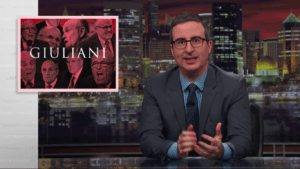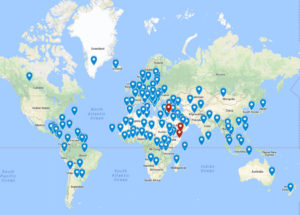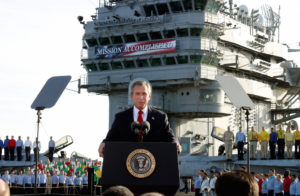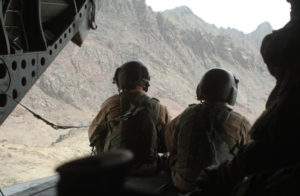Al-Qaida After 9/11: ‘The Most Powerful Military Force in an Area the Size of Britain’
In a report that seemed to escape everyone's notice, Independent writer Patrick Cockburn describes the "spectacular resurgence of al-Qa'ida and its offshoots… despite the huge expansion of American and British intelligence services and their budgets after 9/11."
In a report last month that seemed to escape everyone’s notice, Independent writer Patrick Cockburn describes the “spectacular resurgence of al-Qa’ida and its offshoots… despite the huge expansion of American and British intelligence services and their budgets after 9/11.”
Since the 2001 World Trade Center attacks, “the US, closely followed by Britain, has fought wars in Afghanistan and Iraq, and adopted procedures formerly associated with police states, such as imprisonment without trial, rendition, torture and domestic espionage,” Cockburn writes. “Governments justify this as necessary to wage the ‘war on terror’, claiming that the rights of individual citizens must be sacrificed to secure the safety of all.”
But “[d]espite these controversial security measures, the movements against which they are aimed have not only not been defeated but have grown stronger. At the time of 9/11, al-Qa’ida was a very small organisation, but in 2014 al-Qa’ida-type groups are numerous and powerful. In other words, the ‘war on terror’, the waging of which determined the politics of so much of the world since 2001, has demonstrably failed.”
How has this failure happened? Cockburn calls it “perhaps the most extraordinary development of the 21st century.” Politicians used the threat of al-Qaida to persuade people to give up their civil liberties and allow conservative leaders to expand state power (or “grow government,” as many on the political right would say). Those politicians spent little time figuring out the most effective means of combatting the anti-American movement, however. “They have been able to get away with this by giving a misleading definition of al-Qa’ida, which varied according to what was politically convenient at the time.”
Jihadi groups whose actions are deemed supportive of U.S. policy aims are relabeled as moderate, as is currently the case in Syria. In these situations Washington is effectively handing advanced weaponry over to its enemies. This “helps explain why al-Qa’ida and its offshoots have been able to survive and flourish,” Cockburn writes. “The ‘war on terror’ has failed because it did not target the jihadi movement as a whole and, above all, was not aimed at Saudi Arabia and Pakistan, the two countries that had fostered jihadism as a creed and a movement. The US did not do so because they were important American allies whom it did not want to offend. Saudi Arabia is an enormous market for American arms, and the Saudis have cultivated and, on occasion bought up, influential members of the American political establishment.”
Read more of Cockburn’s five-part investigation into the matter here.
— Posted by Alexander Reed Kelly.
Your support matters…Independent journalism is under threat and overshadowed by heavily funded mainstream media.
You can help level the playing field. Become a member.
Your tax-deductible contribution keeps us digging beneath the headlines to give you thought-provoking, investigative reporting and analysis that unearths what's really happening- without compromise.
Give today to support our courageous, independent journalists.






You need to be a supporter to comment.
There are currently no responses to this article.
Be the first to respond.